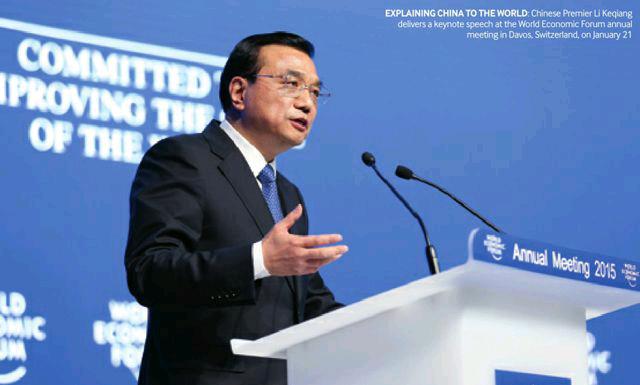Eyes on the East
2015-02-05ByZhouXiaoyan
By+Zhou+Xiaoyan
On the quiet afternoon of January 21, a conference hall at a picturesque northern European town was filled with an audience eagerly awaiting a speech on one of the most pressing issues in the world: Chinas economic slowdown and its consequences.
“The Chinese economy is not heading for a hard landing,” the countrys Premier Li Keqiang reassured attendees of the World Economic Forum (WEF) annual meeting when delivering a keynote speech at the forum, which was held in Davos, Switzerland, from January 21 to 24, under the theme the New Global Context.
During the speech, the Chinese premier elaborated upon his views on global affairs and discussed Chinas economic situation, including measures on deepening reform and structural rebalancing.
China has become the worlds second largest economy. With such a big base, even 7-percent growth means a larger increased amount in the GDP than the 10-percent growth of five years ago, Li said.
“Chinas growth is backed by its 50-percent high saving rate, and 70 percent of local government debt is used for infrastructure construction. The financial reform is ongoing. China will not have regional or systematic financial risks. A hard landing of the economy wont happen,” the Chinese premier argued.
China will continue to push ahead with its reform in key areas in 2015, with the priority being properly handling the relationship between the government and the market, Li said.
“The biggest stimulus for Chinas economic growth lies in peoples pursuit of a better life as well as the reform and opening up,” Li said.
He promised that China will carry out deeper and wider reform in its administrative approval system to stimulate market vitality and create a better environment for fair competition.
China will advance its ongoing reform in fiscal, tax and key financial areas, Li pledged, adding that the country is set to further relax foreign investment access and open its service industry wider to the outside world.
For the Chinese economy to maintain medium-to-high speed growth, Li said, China must fully unleash the potential of the market.
“To foster a new engine of growth, China needs to encourage mass entrepreneurship and innovation, and mobilize the wisdom and power of the people,” Li said.
Over 2,500 participants from more than 140 countries, regions, international organizations, academia, civil society and the media attended the WEF annual meeting to discuss issues like the global economy, environmental protection and non-traditional security.
“China” was undoubtedly a buzzword in the annual gathering. How China, the worlds most dynamic economy, lives up to its role in driving the global economy and how the world judges its reform became a focus of this years forum.
China has sent its highest-level delegation since 2009 to Davos to attend the WEF annual meeting in an effort to boost its presence in global affairs and strengthen market confidence amid an economic downturn.
The Chinese delegation, led by Li, consists of top government officials, economists and business elites including Jack Ma, founder and Executive Chairman of U.S.-listed e-commerce giant Alibaba, and Ren Zhengfei, President of Huawei Technologies, a leading information and communications technology solutions provider.
“The outside world has pinned high hopes on the Chinese economy amid slow global economic recovery and a lack of growth points. Premier Lis elaboration on Chinas economic policies and demonstration of Chinas courage to carry out more reforms have made the world better understand the Chinese economy and strengthened the international communitys confidence in Chinas economic outlook as it undergoes structural changes,” said Chen Fengying, a research fellow at the China Institute of Contemporary International Relations.
Slowdown in check
Despite an obvious slowdown, Chinas economic growth is still impressive compared to other countries. The economy grew 7.4 percent in 2014.
According to the World Banks Global Economic Prospects report, the global economy is projected to expand by 3 percent in 2015, up from the estimated 2.6 percent in 2014. The World Bank forecasted that China, which is undergoing a carefully managed slowdown, may grow at a continuously robust speed of 7.1 percent in 2015.
Katherine Garrett-Cox, CEO of Alliance Trust PLC, an investment and financial services company headquartered in Dundee, Scotland, said Chinas slowdown is not a periodic phenomenon, but a structural change.
Although Chinas GDP growth rate slowed in 2014, the 7.4-percent growth is still envied by many countries in the world, she said.
Jaspal Singh Bindra, CEO of Standard Chartered Asia, also said 7.4 percent is a speed that many countries dream of achieving, adding that China should increase the proportion of its service industry in the broader economy during its structural rebalancing.
Klaus Schwab, founder of the WEF, said he has long been optimistic that China is on the right path of structural adjustment and reforms.
China is still the largest contributor to global economic growth, and the countrys success is impressive. It will be crucial to find ways to unlock Chinas growth potential in a balanced and sustainable way, said Schwab, who turned the world-renowned ski resort of Davos into a venue for the global exchange of opinions.
“I applaud the efforts the Chinese leadership is undertaking in this regard. The transition from mass production to innovation-driven growth is underway, but challenges remain,” he said.
Confronted with the possibility of such challenges, Schwab seems unperturbed. “Ive learned that those who are pessimistic about Chinas development and course are usually proven wrong,” he said.
A major investor
During the WEF annual meeting, Premier Li said Chinese companies will be encouraged to explore the international market, and work for common development with businesses from other countries through greater openness toward each other.
The export of excess capacity in Chinas advantageous industries will create a win-win result.
“On the one hand, it will greatly improve local peoples lives; on the other, it can stimulate demand and prevent deflationary risks against the backdrop of declining global demand,” Li said in Davos.
China used to be a hotspot destination for global capital, by virtue of its cheap land, abundant and cheap labor force and preferential government policies.
The country, however, is changing from a capital receiver to a global investor.
According to data from the Ministry of Commerce (MOFCOM), outbound direct investment (ODI) from China totaled $102.9 billion in 2014, up 14.1 percent, making the country the third largest global investor, whereas foreign direct investment (FDI) to China totaled $119.56 billion, up only 1.7 percent. “China will soon become a net investor,” said Zhong Shan, Vice Minister of the MOFCOM.
“The Chinese Government will encourage Chinese businesses to invest overseas so that they have more development room and can help those countries receiving investment create more jobs, increase tax revenue and promote their economic growth,” Zhong said.
As the next step, China will further expand outbound investment with the Silk Road Economic Belt and 21st Century Maritime Silk Road initiatives and encourage advantageous industries and excess capacity to transfer to countries along the two proposed trade routes, Zhong said.
“Opening factories overseas is not the purpose. Pure manufacturing is meaningless. When investing overseas, Chinese companies should have their own technologies, research and development teams and their own brand, so as to grow hand-in-hand with the local community and reach a win-win result,” said Dong Mingzhu, President of Gree Electric Appliances based in Zhuhai, south Chinas Guangdong Province, during a sideline of the 2015 WEF annual meeting.
Jin-yong Cai, Executive vice President and CEO of the International Finance Corp., said exports of Chinas advantageous industries, such as infrastructure construction, will provide a foundation for future growth in the recipient countries.
“Several risks should be factored in by Chinese businesses when investing overseas,” Cai said. “First, it might be easy to construct a project, but could be difficult to gain returns on that investment due to political instability in some countries. That could be solved by making ordinary people beneficiaries of the project or building shared interests with local companies.”
A shortage of talent is the biggest obstacle standing in the way of Chinese companiesoverseas foray.
“Companies investing overseas should be fully aware of the local culture, political environment, legal environment and language. Lacking familiarity with all the above-mentioned areas would be the biggest constraint,” said Justin yifu Lin, a professor of economics at Peking University and former chief economist and Senior vice President of the World Bank.
